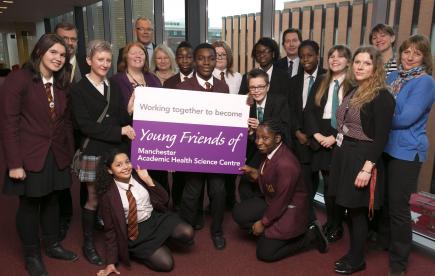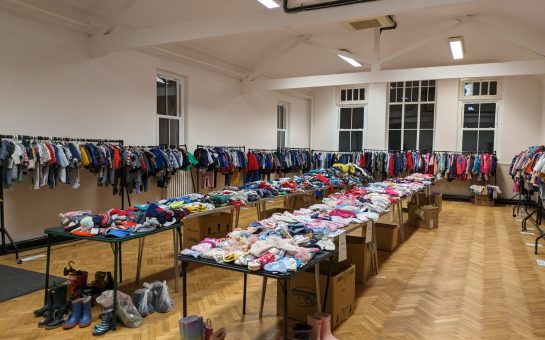The fate of Manchester’s health outcomes lies with our youth, according to a city health chief.
Professor Ian Jacobs, Director of Manchester Academic Health Science Centre (MAHSC), believes that young people can have a ‘profound impact’ on health outcomes for future generations.
The claim comes as young pupils from four secondary schools in Greater Manchester were invited to perform their healthcare ideas in series of dramatised vignettes for 650 leading medical researchers, nurses and doctors on Monday.
The pupils had attended a workshop in November to learn about health problems affecting the population, including smoking, eating a poor diet, and alcohol consumption.
It inspired them to generate their own ideas on healthcare for the future wellbeing of their communities.
Speaking at the event, Professor Jacobs said: “It’s fantastic to have representation from schools in Manchester. It is crucially important because this is engaging the next generation of people in understanding how they can influence health.
“Taking this creative approach enables young people to talk openly about what matters to them, and we’re confident that their performance will make us all think differently about ways to improve public health.
“I was struck by the intelligence and compassion shown by our local young people in the presentations they performed. Their holistic approach to wellbeing in their communities, emphasising essential values such as social and emotional support, is impressively forward thinking, while their ideas for initiatives to improve health outcomes in their areas were creative and innovative.
“As researchers, we need to listen to diverse perspectives and really engage with the young people who can have a profound impact on health outcomes for future generations.”
Prof Ian Jacobs thanks school pupils and speakers for inspirational words #ourimpact2014 pic.twitter.com/ZJA5IOMNuU
— MAHSC (@ManAHSC) December 15, 2014
The performances were the outcome of a unique programme called ‘Young Friends of MAHSC’ that brings together young pupils to assist in making a positive impact on health.
This is the first time MAHSC has worked with Manchester’s schools to tackle public health issues and include the perspectives of young people in shaping its research programmes.
Director of Education for MAHSC, Gillian Wallis, said: “Where young friends of MAHSC came about was the idea that we could engage people at the earlier stages in thinking about their healthcare but also thinking about the healthcare needs of their communities.
“From the schools conference, they came up with a whole range of ideas where MAHSC should be concentrating their efforts and so we came up with the concept that we should have tailored information and ways of involving school children in contributing to MASHC’s vision.
“These ways involved healthcare but also in terms of education, access to education, and the kinds of research questions which they think are really important for their communities.”
In 2008, the Department of Health designated MAHSC as the only Academic Health Science Centre in the North.
It came about because while Greater Manchester has some of the best experts, healthcare professionals and scientists in the country, it also has some of the worst health outcomes.
The purpose of MAHSC however, is to ensure that the newest and best medicines that come out of ideas in Manchester get into the local NHS as quickly as possible.
Pupils from the Manchester Communication Academy – Daniel Rimes, Chelsea Akor, Lucy Iguodala, and Mea Crane, accompanied by their teacher, Amy Jones – felt that MAHSC’s initiative has empowered them to contribute more to health developments.
“Adults usually have the best say in these matters,” said Mea, 13. “As young people we don’t get given the chance to get our opinions across.
“[The conference] has given us a more valued role. It helps others develop in the future but it also develops ourselves.”

COME TOGETHER: Pupils from four different Greater Manchester schools performed their ideas
Daniel, 13, said: “We want to have a Community Health Hub which is based in schools, rather than going to the doctors and just getting a diagnosis. More of a place to talk about your feelings and thoughts, because people don’t want to see doctors as much.”
The pupils also worked with BBC playwright, Sarah Woods, in illustrating wider and subtle factors such as grief and loneliness, and how bringing people together in supportive environments could have a positive influence on communities.
Speaking on the role of drama for the event, Ms Woods said: “So, obviously a lot of the stuff that MAHSC is looking at is quite dry research, and we know from all the recent work done in neuroscience that our brains don’t absorb facts easily. What our brains are wired for however, is story.
“And so what I’ve been working on with the young people is how all of these facts and figures are actually real life stories that are happening to people all over this city.
“So we are using art in communicating things in which people can engage with not just their rational brains, but emotionally and viscerally, and begin to feel empathy, and to come close to some of the experiences that we are talking about.”
David Cameron had announced last week that Maths and Science should be the priority for Britain’s schools, putting into question the perceived importance of the arts.
However, Ms Woods feels that drama has a very important role to play in communicating and understanding information.
Manchester communication academy students suggest health hub for those who do not want to visit the GP #ourimpact2014 pic.twitter.com/PoWRxd0Ndi
— MAHSC (@ManAHSC) December 15, 2014
“Drama has come in for quite a bashing recently both in terms of arts council cuts and the way education has been approached, but we forget that drama has a multifold role to play in education, and actually is about communication, confidence, and about the way that we live,” she said.
“We live our lives through story; we tell ourselves stories about our own lives and the lives of others. It’s very much how we engage with the world.
“I think often drama can be the glue that enables us to not just build good relationships with each other, but to build relationships between different bits of information in different subjects.
“So I think drama comes very close to how the human brain naturally works, and actually what’s important in the world we’re living in which is complex and uncertain, is to perhaps look at a changed role for the arts that is responding and is relevant to the sorts of situations we find ourselves in.”



